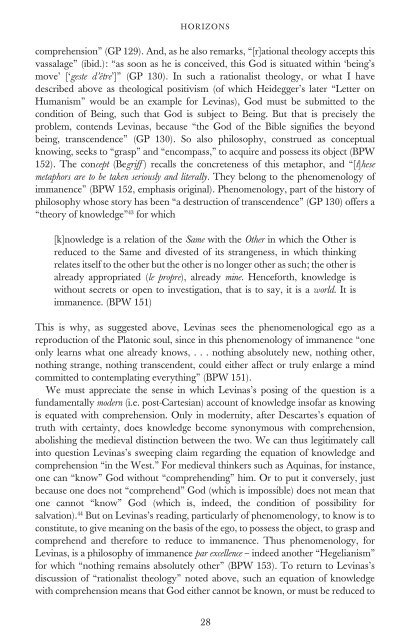Speech and Theology: Language and the Logic of Incarnation
Speech and Theology: Language and the Logic of Incarnation
Speech and Theology: Language and the Logic of Incarnation
You also want an ePaper? Increase the reach of your titles
YUMPU automatically turns print PDFs into web optimized ePapers that Google loves.
HORIZONS<br />
comprehension” (GP 129). And, as he also remarks, “[r]ational <strong>the</strong>ology accepts this<br />
vassalage” (ibid.): “as soon as he is conceived, this God is situated within ‘being’s<br />
move’ [‘geste d’être’]” (GP 130). In such a rationalist <strong>the</strong>ology, or what I have<br />
described above as <strong>the</strong>ological positivism (<strong>of</strong> which Heidegger’s later “Letter on<br />
Humanism” would be an example for Levinas), God must be submitted to <strong>the</strong><br />
condition <strong>of</strong> Being, such that God is subject to Being. But that is precisely <strong>the</strong><br />
problem, contends Levinas, because “<strong>the</strong> God <strong>of</strong> <strong>the</strong> Bible signifies <strong>the</strong> beyond<br />
being, transcendence” (GP 130). So also philosophy, construed as conceptual<br />
knowing, seeks to “grasp” <strong>and</strong> “encompass,” to acquire <strong>and</strong> possess its object (BPW<br />
152). The concept (Begriff ) recalls <strong>the</strong> concreteness <strong>of</strong> this metaphor, <strong>and</strong> “[t]hese<br />
metaphors are to be taken seriously <strong>and</strong> literally. They belong to <strong>the</strong> phenomenology <strong>of</strong><br />
immanence” (BPW 152, emphasis original). Phenomenology, part <strong>of</strong> <strong>the</strong> history <strong>of</strong><br />
philosophy whose story has been “a destruction <strong>of</strong> transcendence” (GP 130) <strong>of</strong>fers a<br />
“<strong>the</strong>ory <strong>of</strong> knowledge” 43 for which<br />
[k]nowledge is a relation <strong>of</strong> <strong>the</strong> Same with <strong>the</strong> O<strong>the</strong>r in which <strong>the</strong> O<strong>the</strong>r is<br />
reduced to <strong>the</strong> Same <strong>and</strong> divested <strong>of</strong> its strangeness, in which thinking<br />
relates itself to <strong>the</strong> o<strong>the</strong>r but <strong>the</strong> o<strong>the</strong>r is no longer o<strong>the</strong>r as such; <strong>the</strong> o<strong>the</strong>r is<br />
already appropriated (le propre), already mine. Henceforth, knowledge is<br />
without secrets or open to investigation, that is to say, it is a world. It is<br />
immanence. (BPW 151)<br />
This is why, as suggested above, Levinas sees <strong>the</strong> phenomenological ego as a<br />
reproduction <strong>of</strong> <strong>the</strong> Platonic soul, since in this phenomenology <strong>of</strong> immanence “one<br />
only learns what one already knows, . . . nothing absolutely new, nothing o<strong>the</strong>r,<br />
nothing strange, nothing transcendent, could ei<strong>the</strong>r affect or truly enlarge a mind<br />
committed to contemplating everything” (BPW 151).<br />
We must appreciate <strong>the</strong> sense in which Levinas’s posing <strong>of</strong> <strong>the</strong> question is a<br />
fundamentally modern (i.e. post-Cartesian) account <strong>of</strong> knowledge ins<strong>of</strong>ar as knowing<br />
is equated with comprehension. Only in modernity, after Descartes’s equation <strong>of</strong><br />
truth with certainty, does knowledge become synonymous with comprehension,<br />
abolishing <strong>the</strong> medieval distinction between <strong>the</strong> two. We can thus legitimately call<br />
into question Levinas’s sweeping claim regarding <strong>the</strong> equation <strong>of</strong> knowledge <strong>and</strong><br />
comprehension “in <strong>the</strong> West.” For medieval thinkers such as Aquinas, for instance,<br />
one can “know” God without “comprehending” him. Or to put it conversely, just<br />
because one does not “comprehend” God (which is impossible) does not mean that<br />
one cannot “know” God (which is, indeed, <strong>the</strong> condition <strong>of</strong> possibility for<br />
salvation). 44 But on Levinas’s reading, particularly <strong>of</strong> phenomenology, to know is to<br />
constitute, to give meaning on <strong>the</strong> basis <strong>of</strong> <strong>the</strong> ego, to possess <strong>the</strong> object, to grasp <strong>and</strong><br />
comprehend <strong>and</strong> <strong>the</strong>refore to reduce to immanence. Thus phenomenology, for<br />
Levinas, is a philosophy <strong>of</strong> immanence par excellence – indeed ano<strong>the</strong>r “Hegelianism”<br />
for which “nothing remains absolutely o<strong>the</strong>r” (BPW 153). To return to Levinas’s<br />
discussion <strong>of</strong> “rationalist <strong>the</strong>ology” noted above, such an equation <strong>of</strong> knowledge<br />
with comprehension means that God ei<strong>the</strong>r cannot be known, or must be reduced to<br />
28



